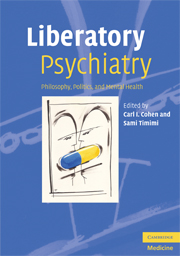Book contents
- Frontmatter
- Contents
- Contributors
- Acknowledgments
- Introduction
- 1 Working towards a liberatory psychiatry? Radicalizing the science of human psychology and behavior
- 2 Power, freedom, and mental health: a postpsychiatry perspective
- 3 Challenging risk: a critique of defensive practice
- 4 Democracy in psychiatry: or why psychiatry needs a new constitution
- 5 German critical psychology as emancipatory psychology
- 6 Psychopolitical validity in the helping professions: applications to research, interventions, case conceptualization, and therapy
- 7 Class exploitation and psychiatric disorders: from status syndrome to capitalist syndrome
- 8 Ecological, individual, ecological? Moving public health psychiatry into a new era
- 9 Children's mental health and the global market: an ecological analysis
- 10 Postcolonial psychiatry: the Empire strikes back? Or, the untapped promise of multiculturalism
- 11 A new psychiatry for a new world: postcolonialism, postmodernism, and the integration of premodern thought into psychiatry
- 12 Neoliberalism and biopsychiatry: a marriage of convenience
- 13 Psychoanalysis and social change: the Latin American experience
- 14 A new psychiatry?
- Index
- References
2 - Power, freedom, and mental health: a postpsychiatry perspective
Published online by Cambridge University Press: 25 August 2009
- Frontmatter
- Contents
- Contributors
- Acknowledgments
- Introduction
- 1 Working towards a liberatory psychiatry? Radicalizing the science of human psychology and behavior
- 2 Power, freedom, and mental health: a postpsychiatry perspective
- 3 Challenging risk: a critique of defensive practice
- 4 Democracy in psychiatry: or why psychiatry needs a new constitution
- 5 German critical psychology as emancipatory psychology
- 6 Psychopolitical validity in the helping professions: applications to research, interventions, case conceptualization, and therapy
- 7 Class exploitation and psychiatric disorders: from status syndrome to capitalist syndrome
- 8 Ecological, individual, ecological? Moving public health psychiatry into a new era
- 9 Children's mental health and the global market: an ecological analysis
- 10 Postcolonial psychiatry: the Empire strikes back? Or, the untapped promise of multiculturalism
- 11 A new psychiatry for a new world: postcolonialism, postmodernism, and the integration of premodern thought into psychiatry
- 12 Neoliberalism and biopsychiatry: a marriage of convenience
- 13 Psychoanalysis and social change: the Latin American experience
- 14 A new psychiatry?
- Index
- References
Summary
Through these different practices – psychological, medical, penitential, educational – a certain idea or model of humanity was developed, and now this idea of man has become normative, self-evident, and is supposed to be universal. Humanism may not be universal but may be quite relative to a certain situation … This does not mean that we have to get rid of what we call human rights or freedom, but that we can't say that freedom or human rights has to be limited at certain frontiers. For instance, if you asked 80 years ago if feminine virtue was part of universal humanism, everyone would have answered, yes. What I am afraid of about humanism is that it presents a certain form of our ethics as a universal model for any kind of freedom. I think that there are more secrets, more possible freedoms, and more inventions in our future than we can imagine in humanism as it is dogmatically represented on every side of the political rainbow: the Left, the Centre, the Right.
(Foucault, 1988)Some time ago, we were trying to help a young woman who heard voices. She had always found it impossible to talk about her experiences. People were unaware that she had the experience. She kept it hidden, a secret. And when the psychiatrists did find out, her worst fears were realized. She was told that she had schizophrenia (she knew that this was not so). She rejected their opinion.
- Type
- Chapter
- Information
- Liberatory PsychiatryPhilosophy, Politics and Mental Health, pp. 35 - 54Publisher: Cambridge University PressPrint publication year: 2008

